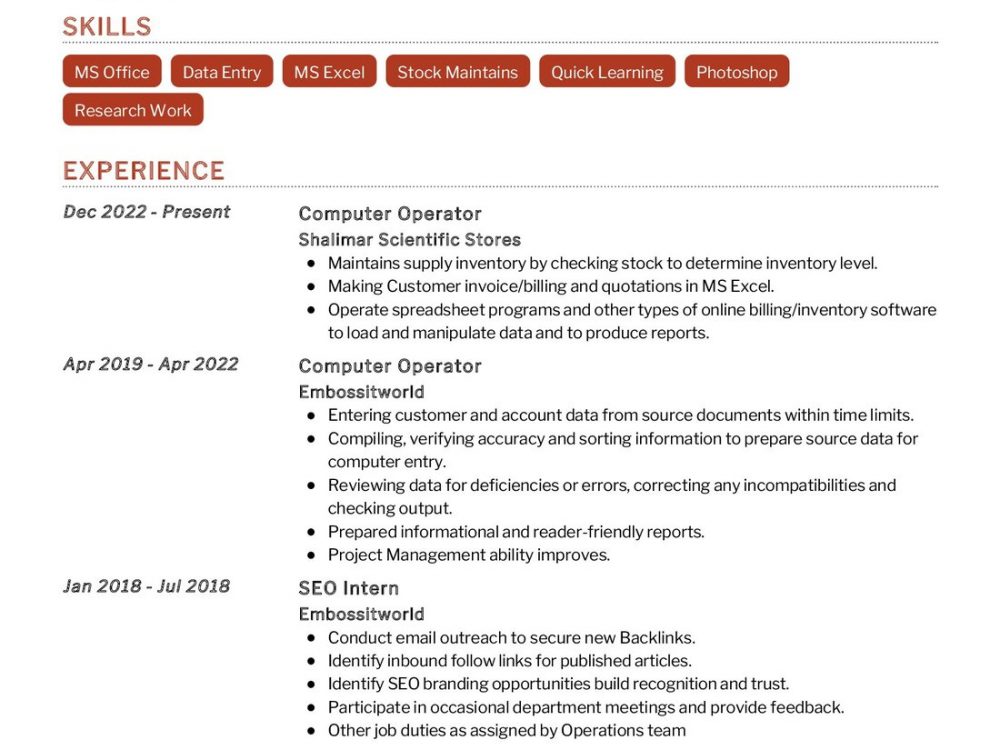Understanding the Role of a Computer Operator
In the ever-evolving landscape of technology, the role of a Computer Operator stands as a vital component in ensuring the seamless functioning of computer systems and networks. A Computer Operator is responsible for the efficient operation of computer hardware systems, ensuring that all processes run smoothly and without interruption. Let’s delve deeper into the multifaceted responsibilities and essential skills that define the role of a Computer Operator, a position that requires a keen eye for detail and technical expertise.
What are the Job Requirements for a Computer Operator?
Embarking on a career as a Computer Operator demands a strong foundation in technical skills and a deep understanding of computer systems. Let’s explore the fundamental requirements that one must fulfill to excel in this role:
- A solid understanding of computer hardware and software, acquired through formal education or hands-on experience.
- Proficiency in operating systems such as Windows, Linux, or Unix, showcasing adaptability in navigating different environments.
- Knowledge of basic networking concepts, ensuring smooth communication between different systems and devices.
- Ability to troubleshoot technical issues efficiently, employing critical thinking and problem-solving skills to resolve complex issues.
- Attention to detail and a proactive approach to system monitoring, ensuring early detection and resolution of potential issues.
- Excellent communication skills, enabling effective interaction with team members and users to address their technical concerns.
Continued learning and staying updated with the latest technological advancements are crucial for excelling in this dynamic field.
Responsibilities of a Computer Operator
The role of a Computer Operator encompasses a diverse range of responsibilities, all crucial in maintaining the smooth functioning of computer systems. Let’s explore the key responsibilities that define the role:
- Monitoring computer systems and networks for smooth operations and identifying any potential issues.
- Executing regular system backups to safeguard critical data and ensure business continuity in case of system failures.
- Responding to user inquiries and providing technical support when required, ensuring a seamless user experience.
- Installing and configuring computer hardware and software, ensuring compatibility and optimal performance.
- Maintaining documentation of system operations and technical issues, creating a comprehensive record for future reference.
- Collaborating with IT teams to ensure the security of systems and networks, implementing necessary security measures and protocols.
- Conducting routine maintenance tasks to ensure the longevity and efficiency of computer systems and peripherals.
Each responsibility requires a blend of technical expertise and meticulous attention to detail, ensuring the smooth operation of computer systems.
Effective CV Writing Tips for Computer Operators
Crafting a compelling CV as a Computer Operator requires presenting your skills and experiences in a clear and concise manner. Here are some tips to help you create an impactful resume:
- Highlight your technical proficiency in operating different computer systems and software.
- Emphasize your problem-solving skills, showcasing instances where you resolved complex technical issues efficiently.
- Include any relevant certifications or training you have received to demonstrate your commitment to continued learning.
- Tailor your resume to highlight specific achievements and experiences that align with the job requirements.
Each tip serves as a guide to help you create a resume that highlights your strengths and capabilities as a Computer Operator.
Examples of a Computer Operator CV Summary
Your resume summary serves as an introduction to your professional journey, encapsulating your skills and experiences. Here are a few examples to inspire you:
- “Dedicated Computer Operator with 5 years of experience, adept at maintaining system efficiency and providing timely technical support to users.”
- “Experienced in monitoring and troubleshooting complex computer systems, with a track record of ensuring uninterrupted operations and user satisfaction.”
- “Detail-oriented Computer Operator with a strong background in system maintenance and data backup, ensuring data integrity and system reliability.”
Each summary provides a snapshot of your career, showcasing your expertise and commitment to ensuring smooth computer operations.
Building a Strong Experience Section for Your Computer Operator CV
Your experience section serves as a testament to your expertise and accomplishments in the field of computer operations. Here are some examples to guide you:
- “Monitored and maintained computer systems in a busy office environment, ensuring 99% uptime and minimal disruption to daily operations.”
- “Implemented a comprehensive data backup plan, resulting in a 30% decrease in data loss incidents and ensuring business continuity during system failures.”
- “Provided technical support to users, resolving 95% of inquiries within a timely manner and maintaining a high level of user satisfaction.”
Each experience serves as a testament to your skills and contributions in ensuring the smooth functioning of computer systems.
Education Section for Your Computer Operator CV
Your educational background lays the foundation for your career as a Computer Operator. Here’s how you can present your educational qualifications:
- Bachelor’s degree in Computer Science, XYZ University, 2016.
- Associate Degree in Information Technology, ABC College, 2014.
- CompTIA A+ Certification, demonstrating expertise in IT operational procedures and hardware knowledge, 2015.
Each educational milestone reflects your commitment to learning and gaining expertise in computer operations.
Essential Skills for a Computer Operator CV
Your skill set serves as a testament to your capabilities and expertise in handling computer systems and ensuring their smooth operation. Let’s explore some essential skills for a Computer Operator CV:
Soft Skills:
- Attention to detail, ensuring thorough monitoring and maintenance of computer systems.
- Problem-solving abilities, enabling efficient resolution of technical issues and user concerns.
- Effective communication, facilitating clear interaction with users and team members.
- Adaptability, enabling quick adjustment to new systems and technologies.
- Teamwork, fostering collaboration and effective coordination with IT teams and other stakeholders.
Hard Skills:
- Proficiency in operating system management, ensuring efficient navigation and control of computer systems.
- Network management, enabling smooth communication and data transfer between interconnected systems.
- System backup and recovery, safeguarding critical data and ensuring business continuity during system failures.
- Technical troubleshooting, facilitating efficient diagnosis and resolution of technical issues.
- Documentation management, creating a comprehensive record of system operations and technical problems for future reference.
Each skill underscores your proficiency and competence in maintaining and managing computer systems effectively.
Common Mistakes to Avoid When Crafting a Computer Operator CV
While creating your CV, it’s essential to steer clear of common mistakes that can hinder your chances of landing your dream job. Here are some pitfalls to avoid:
- Avoid using a generic CV template; tailor your CV to highlight your specific skills and experiences as a Computer Operator.
- Avoid neglecting to showcase your problem-solving skills and technical expertise, as these are crucial for the role.
- Don’t overlook the importance of a well-structured and error-free CV; ensure your CV is easy to read and free from grammatical errors.
- Avoid overemphasizing unrelated skills or experiences that are not relevant to the role of a Computer Operator.
- Avoid submitting a CV without proofreading; ensure your CV reflects a high level of professionalism and attention to detail.
Avoiding these mistakes will help you create a compelling CV that highlights your unique strengths and capabilities as a Computer Operator.
Key Takeaways for Your Computer Operator CV
As we conclude this comprehensive guide, here are some key points to remember when crafting your Computer Operator CV:
- Emphasize your technical skills and problem-solving abilities, showcasing your proficiency in managing computer systems.
- Highlight your experience in providing technical support and ensuring the smooth operation of computer hardware and software.
- Include a section highlighting any relevant certifications or training you have completed to demonstrate your commitment to professional development.
- Ensure your CV is well-structured, error-free, and tailored to highlight your specific fit for the role of a Computer Operator.
Finally, feel free to utilize resources like AI Resume Builder, Resume Design, Resume Samples, Resume Examples, Resume Skills, Resume Help, Resume Synonyms, and Job Responsibilities to create an outstanding CV and prepare for the [Computer Operator job interview](https://resumekraft.com/interview-questions/).


